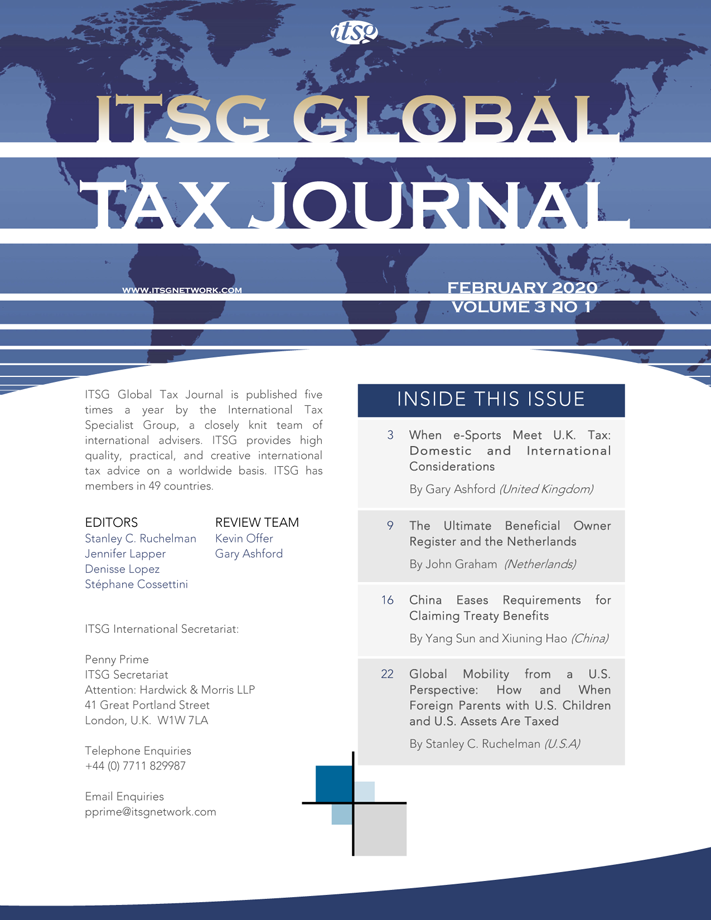Introduction
When individuals outside the U.S. contemplate an initial investment in the U.S., certain issues pop up when charting a tax plan:
- Should I invest directly, through a corporation, or a trust?
- Will the U.S. investment be subject to estate tax in the U.S.?
- If I form a trust, should it be formed in the U.S. or abroad?
- If I have a child in the U.S., will my investment affect the child?
- Is my child affected already because of U.S. reporting rules?
When a non-U.S. individual has children that attend university in the U.S., other questions arise:
- When my children inherit property, will they be subject to inheritance tax in the U.S. as a result of receiving the bequest or the inheritance?
- If my property is located outside the U.S., will my children be subject to estate tax in regard to that property?
Both sets of questions reflect a world without borders where parents are resident outside the U.S., but children or investments are located in the U.S.
In question and answer format, this article addresses tax issues often encountered by non-U.S. individuals. It begins by looking at trusts as vehicles to obtain a tax benefit and then looks at the tax implications of continuing direct ownership by the non-U.S. individual. Whether property is owned through a trust or directly, planning is required to avoid the imposition of unnecessary tax that can be penal in amount.
Transfer of assets to a Trust
Question 1: I am planning to move to the U.S. and arranged the formation of a trust to hold certain assets. Will the income of the trust be taxed immediately in the U.S.? If so, will the trust be taxed, will I be taxed, or will all beneficiaries be taxed?
In broad terms, the income of the trust will be taxed at some level. But identifying the party that is taxed, the income that is taxed, and the time when the tax is imposed will depend on the answers to several questions:
- Is the trust foreign or domestic for U.S. income tax purposes, and how does that affect the imposition of tax?
- Is the trust a taxpayer in its own right or is someone else the taxpayer?
- Does it matter whether the trust is ‘revocable’ or ‘irrevocable’?
- If U.S. tax is imposed on beneficiaries, is the tax affected by the residence or citizenship of the beneficiaries?
- How do the investments held in trust affect the imposition of tax?
- Will the pattern of trust distributions among beneficiaries in earlier years affect the way tax is imposed in a subsequent year?
Foreign trusts and domestic trusts
Question 2: The trustee is my attorney in my present country of residence. The trust contains no provision for a protector and no one other than the trustee has powers over possible distributions to beneficiaries or the making of an investment. Local courts have primary jurisdiction to hear disputes over trust administration. All the assets will be in the U.S. Will the trust be considered to be a foreign trust for U.S. income tax purposes?
Yes, the trust will be a foreign trust. Under U.S. tax law, a foreign trust is defined to be any trust that is not a domestic trust1.
For a trust to be a domestic trust, two tests must be met. First, a U.S. court must exercise primary supervision over the trust’s administration (the Court Test). Second, one or more U.S. persons must have the authority to control all substantial decisions affecting the trust (the Control Test)2.
The Court Test is met where:
- The trust instrument does not direct that the trust be administered outside the U.S.
- The trust, in fact, is administered exclusively in the U.S.
- The trust is not subject to an automatic migration provision, i.e., a provision that provides that a U.S. court’s attempt to assert jurisdiction or otherwise supervise the administration of the trust directly or indirectly would cause the trust to migrate from the U.S. (but not if it applies only in the case of foreign invasion of the U.S. or widespread confiscation or nationalization of property in the U.S.).
The Control Test requires that one or more U.S. persons (e.g., a U.S. citizen, U.S. resident, or U.S. corporation) have authority to control all substantial decisions of the trust. The term ‘substantial decisions’ means all decisions other than ministerial decisions that any person, whether acting in a fiduciary capacity or not, is authorized or required to make under the terms of the trust instrument or applicable law. These include decisions regarding:
- Whether and when to distribute income or principal
- The amount of any distributions
- The selection of a beneficiary
- The power to make investment decisions
- Whether a receipt is allocable to income or principal
- Whether to terminate the trust
- Whether to compromise, arbitrate, or abandon claims of the trust
- Whether to sue on behalf of the trust or to defend suits against the trust
- Whether to remove, add, or replace a trustee
- Whether to appoint a successor trustee or trustees
If either the Court Test or the Control Test is not met, a trust is considered a foreign trust.
Question 3: I plan to make certain revisions to the trust instrument in Question 2. A court in Wyoming will be given primary supervision over the trust under the terms of the revised instruments, and two trustees will be appointed, of which one will be my current attorney, whom I trust, and the other will be a trust company in Wyoming. The trustees must act in unanimity. Is the trust a U.S. trust?
No, the trust is not a U.S. trust even though the Court Test is met because the Control Test is not met. For the Control Test to be met, one or more U.S. persons must have the authority to control all substantial decisions. ‘Control’ means having the power, by vote or otherwise, to make decisions affecting the trust, none of which can be vetoed by a person who is not a U.S. person3. If more than one trustee exists and the trustees must act by unanimity, the presence of a non-U.S. person as one trustee will prevent the trust from meeting the Control Test4.
Question 4: I plan to have the relevant jurisdiction of the trust moved to Wyoming and to have a Wyoming trust company be appointed as successor to the current trustee once the move is effected. As the trustee, the Wyoming trust company will have the sole power to make substantial decisions with one exception. My first cousin is an excellent financial planner. He resides in Scotland and is not a U.S. person. I want him to continue as financial manager of the trust with discretionary authority to make investment decisions. Will my cousin’s appointment cause the trust to be a foreign trust?
No, the cousin’s appointment as investment manager will not cause the trust to be a foreign trust even though the cousin is not a U.S. person. As long as the Wyoming trust company retains the power to terminate the agreement under which the Scottish cousin serves as investment manager, investment decisions will be considered to be substantial decisions controlled by a U.S. person5.
Question 5: What decisions are not substantial decisions?
The following decisions are ministerial and, for that reason, are not substantial:
- Bookkeeping
- Collection of rents
- Execution of investment decisions6
Grantor v. non-grantor and revocable v. irrevocable trusts
Question 6: I understand that U.S. tax law provides one type of treatment for trusts referred to as ‘grantor trusts’ and a different type of treatment for trusts referred to as ‘non-grantor trusts’. What is the difference?
Non-grantor trusts
A non-grantor trust is treated as the taxpayer and, as such, is taxable on trust income that is undistributed by the end of the year. To the extent that income is distributed to beneficiaries in the year recognized by the trust, the trust is a modified conduit to the beneficiaries.
The modified conduit treatment accorded to a non-grantor trust is achieved in the following way. First, the trust recognizes, for tax purposes, all income and gains realized during the year. Second, in computing its net taxable income, the trust is allowed a deduction for (i) all amounts that are actually distributed during the year and, if an election is made by the trust, (ii) amounts that are recognized in the year but are distributed within the first 65 days of the following taxable year. The election is made on a timely-filed return of the trust. Finally, the beneficiaries realize income equal to the amount of the distribution. The character of each dollar received in the distribution as foreign- or domestic-source ordinary income, qualified dividends, or long-term capital gain is the same for all beneficiaries receiving distributions. The total amount included in income by the beneficiaries as a result of the distribution and the amount deductible by the trust are limited by the distributable net income (D.N.I.)9 of the trust. The beneficiaries will include the distribution in taxable income, and the distributed income will have the same character in the hands of the beneficiary as it had in the hands of the trust.
Grantor trusts
In comparison, a grantor trust generally will be disregarded for U.S. income tax purposes. The grantor will be considered the owner of the trust assets and of the trust income.
If the trust is a grantor trust, the grantor is considered the taxpayer10. The grantor is not necessarily the person who settles the trust. Rather, the grantor is any person who gratuitously transfers assets to the trust. A grantor trust may have more than one grantor, each being a grantor over the portion he or she contributes.
When a beneficiary of a grantor trust receives a distribution from a grantor trust, the distribution is treated as a gift from the grantor for substantive income tax purposes. Nonetheless, if the grantor trust is a foreign trust, a U.S. beneficiary must report the distribution solely for information reporting purposes. See the answer to Question 8, below, for additional information on the reporting obligation.
Question 7: My plans may change, and I may remain a non-resident of the U.S. In that case, I intend to form a trust for the benefit of my children and a charity. The trust will be irrevocable. Is the trust a grantor trust or a non-grantor trust?
The trust is a non-grantor trust.
A non-U.S. person can be treated as a grantor of a grantor trust in only two fact patterns11. The first fact pattern involves a non-U.S. person who makes a gratuitous transfer of assets to the trust but retains the right to revoke the trust and to be revested absolutely in the title to the property12. The revocation must be exercisable at the sole discretion of the non-U.S. person without the need to obtain the approval or consent of any other person, other than a related or subordinate party who is subservient to the grantor. The non-U.S. person must be able to exercise this power on at least 183 days during the taxable year13. The second fact pattern involves a non-U.S. person who makes a gratuitous transfer of assets to the trust where the trust deed provides that only the grantor and the grantor’s spouse may receive distributions from the trust during the lifetime of the grantor14.
The trust is a non-grantor trust because neither fact pattern exists. The trust is irrevocable, and the beneficiaries include persons other than the grantor or the grantor’s spouse.
Question 8: If my plans change, I may want to take back the funds from the trust that I settle for the benefit of my children and a charity. For that reason, the trust may be revocable so that I can do so without the approval or consent of any other person. The trust may also be formed outside the U.S. When the trust makes a distribution to a beneficiary that is resident in the U.S., must any information be reported to the I.R.S.?
Yes. The distribution should be reported by the U.S. beneficiary on Part III of Form 3520, Annual Return to Report Transactions with Foreign Trusts and Receipt of Certain Foreign Gifts15. Part III is used to report trust distributions, even if the distribution is treated as a gift for substantive tax purposes in the U.S. In addition, the trust must provide the U.S. beneficiary with a Foreign Non-grantor Trust Beneficiary Statement. In this case, a Foreign Grantor Trust Beneficiary Statement appears to be inappropriate because there is no U.S. person that transferred assets to the trust.
The Foreign Non-grantor Trust Beneficiary Statement must include the following items:
- An explanation of the appropriate U.S. tax treatment of the distribution or sufficient information to enable the U.S. beneficiary to establish the appropriate treatment of the distribution for U.S. tax purposes
- A statement identifying whether any grantor of the trust is a partnership or a foreign corporation
- A statement that the trust will permit either the I.R.S. or the U.S. beneficiary to inspect and copy the trust's permanent books of account, records, and other documents necessary to establish the appropriate treatment of any distribution for U.S. tax purposes
- The first and last day of the tax year of the foreign trust
- A description of property (including cash) distributed to the U.S. beneficiary during the tax year, and the fair market value of the property distributed
- A statement as to whether the foreign trust has appointed a U.S. agent and the name, address, and taxpayer identification number of any such agent
Accumulation distributions
Question 9: Several years ago, I formed an irrevocable trust for the benefit of my wife and children. The trust owns several apartment buildings in my home country. The buildings generate rental income. The rents have been retained in the trust. Under the terms of the trust, earnings that are not distributed are allocated to capital. One of my children moved to the U.S. several years ago and is now in the process of becoming a U.S. citizen. One day, the trust is expected to make a large capital distribution to my children. Will that distribution result in a U.S. tax problem for my U.S. child?
Yes. The distribution will generate adverse tax consequences for the child that is U.S. person.
The adverse tax consequences arise from the way U.S. tax law treats distributions that arise from accumulated income. If a non-U.S. trust accumulates income – up to the amount of D.N.I. – the treatment of the accumulations for U.S. tax purposes will diverge from the treatment of the accumulations for trust law purposes. Retained D.N.I. is not treated as capital for U.S. income tax purposes. Rather, it is converted into undistributed net income (U.N.I.). Should the trust ever make a distribution of income that exceeds D.N.I. for that year, the excess amount will be treated as a distribution made from U.N.I., until the balance of the U.N.I. is fully distributed.
Note that D.N.I. is a cap and does not mean income. The term ‘income’, when not preceded by the words ‘taxable’, ‘distributable net’, ‘undistributed net’, or ‘gross’, means the amount of income of the trust for the taxable year determined under the terms of the governing instrument and applicable local law. Typically, that means income actually received by the trust and not income that is attributed to the trust because, for example, it invests in a tax transparent entity. This will be important in relation to planning opportunities discussed below in the answer to Question 10.
Distributions from U.N.I. are taxed under a ‘throwback rule’ that allocates the distributed U.N.I. to prior years16. The application of the throwback rule causes the D.N.I. of prior years to be taxed as if received in the prior years. This increases the tax in earlier years and the increased tax is deemed to be paid late. An interest charge is applied to the late tax payment. The throwback tax is intended to produce a rough approximation of the tax the beneficiary would have been required to pay if the foreign non-grantor distributed income to the beneficiary in the year earned. The computation is made under a formula provided in the statute. Two methods are provided to calculate the throwback tax. One is the actual method which requires detailed information for the entire period of existence of that trust, and the other is a default method which extrapolates information for a relatively current period of time to a period consisting of half the number of years in which the trust was in existence.
In making the computations, all long-term capital gain items that have not been distributed on a current basis lose their character as long-term capital gains and do not benefit from favourable tax rates. Similar treatment applies to qualified dividends. In addition to income tax, net investment income tax of 3.8% may be imposed.
Note that the tax cannot be eliminated by having the trustee treat the distribution as a capital distribution. As mentioned above, all distributions are deemed to consist of (i) income and gains of the current year, to the extent thereof, (ii) then to U.N.I. from earlier years, to the extent thereof and (iii) finally to capital of the trust on a pro rata basis17. Once the D.N.I. and U.N.I. are fully distributed, the balance of a distribution may be treated as tax-free capital.
Question 10: Are there any planning tools that can be used to mitigate accumulation distributions to U.S. citizen beneficiaries?
Several planning opportunities may be considered to mitigate adverse U.S. income tax consequences.
Form a holding partnership below trust
Perhaps the most effective way of limiting accumulation distributions is to have the trust form a partnership that will be the vehicle used for making all investments. Although a partnership is generally viewed as transparent for purposes of computing income tax liabilities of its members, the local law applicable to trust accounting often treats a partnership as a separate entity so that a trust does not realize income for trust accounting purposes until all events have taken place indicating that the trust is entitled to a current distribution from the partnership. Under applicable I.R.S. regulations, local law controls the term ‘income’ for purposes of U.S. tax law applicable to trusts18. Thus, income generated at the partnership level is not income of the trust for fiduciary accounting purposes until actual distributions are made. Hence, a partnership can be used as an aggregator of income to prevent the build-up of income in the trust. When distributions are to be made by the trust, they are preceded by distributions from the partnership that create D.N.I. when and as made. This planning alternative cannot help to reduce U.N.I. from years that preceded the creation of the partnership.
Establish second trust non-U.S. children
The principal problem for the U.S. beneficiary is the cost of the throwback tax on accumulation distributions. One way to address the issue for existing U.N.I. involves the establishment of a second trust for the benefit of children that are not U.S. citizens. The establishment of the second trust would align the client’s estate planning goals with the child’s new status as a U.S. citizen. At the same time, it would remove existing U.N.I. from the existing trust and prevent a build-up of U.N.I. in future years. Here are the elements of the plan:
- A second trust would be formed for the benefit of the non-U.S. children.
- The U.S. child will remain a beneficiary of the first trust.
- The second trust would be become a beneficiary of the first trust, and the non-U.S. children will be removed as beneficiaries of the first trust.
- A substantial distribution equal to the current year’s D.N.I. and the balance of the U.N.I. would be made to the second trust.
- The U.S. beneficiary and the second trust, or just the second trust, would take current year distributions eliminating the D.N.I. of each year.
- The non-U.S. children would receive distributions only from the second trust.
Distributions of fixed amounts
When a foreign trust is newly formed, the trust deed can provide for up to three distributions of fixed amounts over a period of time to a U.S. beneficiary. The trust instrument cannot direct that the distribution is payable only from trust income. When this type of provision is in the original documentation of a trust, the act of carrying out the transfer is not treated as a distribution. Rather, it is a form of deferred gift that does not come from D.N.I. or U.N.I.19. It can be received tax-free by the recipient.
Distribution of high-value/low-basis assets
With the exception of a required distribution of trust accounting income or other fixed amount, the taxable amount of a distribution of property other than cash to a beneficiary is the lesser of the trust’s basis in the distributed property or its value at the time of distribution. This reflects the rule that the trust generally does not recognize gain at the time of the distribution. This leaves the gain recognition event to the beneficiary at the later date when the beneficiary sells the property20. The beneficiary’s basis for computing gain or loss on the sale will be the same as the trust’s basis.
When an asset is distributed and the asset has a value reflecting significant built-in gain, the U.S. beneficiary’s tax burden in the year of the distribution can be reduced significantly. D.N.I. is not created, and in circumstances where total distributions to all beneficiaries exceeds D.N.I., non-U.S. persons receive cash, and the U.S. beneficiary receives appreciated property, throwback tax may be reduced.
U.S. Estate & Gift Tax
Scope of tax
Question 11: I have one child who is a U.S. person, and my wife has passed away. I have executed a will providing that my entire estate will be left to that child. Most of my property is located in my home country. Will the child be subject to inheritance tax on the receipt of the bequest?
No. Estate tax in the U.S. is imposed on the estate of the decedent, not on the heirs or legatees who receive property.
The taxable estate of an individual decedent who is neither a citizen nor a resident of the U.S. is computed generally by taking into account only property situated in the U.S. and often referred to as ‘U.S.-situs property’21. This limitation in scope affects both assets included in the gross estates and liabilities and costs that reduce the estate.
Examples of U.S. situs property include:
- Real estate located in the U.S.
- Debt instruments issued by U.S. companies or U.S. citizen or resident individual (other than debt having the character of portfolio debt22, U.S. bank accounts23, and short-term commercial paper24)
- Shares of stock of U.S. corporations
- Personal property located in the U.S. at the time of the decedent’s death25
Generally, indirect ownership of U.S.-situs assets through a foreign corporation is not sufficient to expose the estate of a non-domiciled, non-citizen individual to U.S. estate tax. Consequently, no tax is imposed when a foreign individual owns shares of stock of a foreign corporation that, in turn, owns U.S.-situs property such as shares of stock in a U.S. corporation. These foreign corporations are referred to as blocker corporations and have a long history of being allowed. Nonetheless, where a non-U.S. person ignores most or all of the corporate formalities so that the blocker corporation is viewed to be an alter ego of its shareholder, the blocker corporation may be ignored26. As a rough rule of thumb, if a non-U.S. person ignores the separate status of a blocker corporation, it should be expected that the I.R.S. will do so as well.
Second, the amount of funeral expenses, administration expenses, claims against the estate, and unpaid mortgages that may be applied to reduce the U.S. gross estate of a non-U.S. is limited to a percentage based on the portion of the worldwide estate that is located in the U.S.27. A true and accurate accounting must be made in the U.S. estate tax return of the worldwide assets of the non-U.S. decedent. If not made, none of the expenses, losses, indebtedness, and taxes are available to reduce the gross estate28.
While there is no estate tax imposed on foreign assets owned by a non-U.S. individual, the U.S. child is obligated to report the receipt of the inheritance to the I.R.S. The report is made on Form 3520, Annual Return to Report Transactions with Foreign Trusts and Receipt of Certain Foreign Gifts, which is more of an anti-money laundering form than a tax return. If the U.S. child fails to file the form fully and on time, a penalty may be imposed of up to 25% of the amount that goes unreported.
Question 12: At the conclusion of my U.S. child’s lifetime, will the child’s property located outside the U.S. received from me in prior years as a gift or bequest be subject to U.S. estate tax? If the property is subject to inheritance tax in the country where situated, how will double tax be avoided?
Yes, the property situated outside the U.S. will be subject to U.S. estate tax if the decedent child is a U.S. citizen at the conclusion of lifetime or is domiciled in the U.S. even if not a citizen. Double taxation is alleviated through a foreign tax credit mechanism.
All property owned at the time of death by (i) U.S. citizens and (ii) non-U.S. citizen individuals who are domiciled in the U.S. is subject to U.S. estate tax. It does not matter where the property is located.
The estate may be reduced by funeral and administration expenses, indebtedness, and claims against the estate29. In addition, U.S. tax law allows a credit that is the equivalent of a lifetime gift tax and estate tax exemption for individuals. For 2020, the exemption amount is U.S. $11.58 million30. Cumulative lifetime taxable gifts are added to the taxable estate to unify the gift and estate tax system31. Married couples may combine the exemptions so that if the first spouse to die owns insubstantial assets, the unused exemption may be claimed at the time of death of the survivor32.
If the surviving spouse is a U.S. citizen and the decedent is a U.S. citizen or domiciled in the U.S., the decedent is entitled to an unlimited marital deduction for amounts bequeathed to the spouse33. If the surviving spouse is not a U.S. citizen, the deduction is allowed only if the property is transferred to a qualified domestic trust34.
If the property is located outside the U.S., a foreign tax credit may be claimed for the amount of any estate, inheritance, legacy, or succession taxes actually paid to another jurisdiction in respect of any property situated within that country and included in the gross estate of the decedent under foreign law35. The U.S. is a party to only 17 estate tax treaties and one income tax treaty that covers U.S. estate tax.
Residence for estate tax purposes
Question 13: I own a condominium in Florida where I spend several months each winter. I return to my home country for the balance of the year. Will my annual stay in Florida and the ownership of the condominium cause me to become a resident of the U.S. for estate tax purposes?
No. A substantial presence test is not applied to determine residence for estate tax purposes.
The U.S. estate tax rules differ from the U.S. income tax rules. For income tax purposes, residence is based on objective factors such as the number of days present in the U.S. or the issuance of a permanent resident visa. In comparison, residence for estate tax purposes is based on concepts of domicile. A person acquires a domicile in a place by living there, for even a brief period of time, without the presence of a definite intention to leave. Consequently, a facts and circumstances test is used to determine domicile. On the other hand, if a non-U.S. individual is a permanent resident of the U.S. who holds a ‘green card’, the I.R.S. will presume that the individual is domiciled in the U.S. This can be overcome, in principle, by demonstrating the existence of facts to the contrary. The burden of proof will be on the estate of the decedent.
Scope of estate tax for non-residents
Question 14: Even though I am not domiciled in the U.S., will my condominium in Florida be subject to U.S. estate tax?
Yes. Florida law provides that a condominium is a form of ownership of real property, created pursuant to Chapter 718 of the Florida Statutes, which is comprised entirely of units that may be owned by one or more persons and in which there is, appurtenant to each unit, an undivided share in common elements36. Therefore, the condominium is an item of U.S.-situs real property. The unit and all belongings located in it will be included in a U.S. taxable estate.
Question 15: Will the answer change if I transfer the condominium to a discretionary, irrevocable trust for the benefit of myself and my descendants?
No. The answer will not change.
In some instances, property not legally owned at the conclusion of lifetime may be included in a taxable estate. For this to occur, the decedent must have transferred property during his or her lifetime but retained sufficient interest in or control over the transferred assets for the remainder of their life or for any period not ascertainable without reference to their death. An asset will be included in a taxable estate if the decedent retained the possession or enjoyment of, or the right to the income from, the property37. Also included are assets that the decedent transferred during life but with regard to which the decedent had the power to alter, amend, revoke, or terminate the enjoyment of the property through retained powers38. This rule applies to a revocable or amendable trust.
Question 16: Will I be subject to U.S. gift tax if I transfer the condominium to a discretionary, irrevocable trust for the benefit of myself and my descendants?
Yes. The transfer will be subject to gift tax.
The transfer of the U.S. condominium to the irrevocable trust will give rise to gift tax because a condominium unit generally is viewed to be real property and transfers of real property are subject to gift tax. When determining estate tax, a credit against estate tax due is allowed for previously paid gift tax39.
In comparison, if a foreign person owned shares of a cooperative and a proprietary lease to an apartment instead of a condominium, the assets owned by the individual would be considered to be intangible personal property. Such property is not subject to gift tax.
Question 17: My condominium in Florida is held by a U.S. corporation that I own. I understand that the shares of the U.S. corporation will be subject to U.S. estate tax. I am considering a transfer of the shares of the U.S. corporation to a new corporation that I recently formed in my home country in return for shares of stock in the acquiring corporation. Will the contemplated transaction insulate me from U.S. estate tax?
No. Under the anti-inversion rules of U.S. tax law40, the foreign corporation that receives the shares of the U.S. corporation in return for newly issued shares of the acquirer is treated as a U.S. corporation for all purposes of U.S. tax when more than 80% of the shares of the acquirer are held because its shareholders were shareholders of the target.
Question 18: I understand that U.S. estate tax law provides for a unified credit that can be applied to reduce gift and the estate taxes on a specified amount of income. Someone told me that the basic exemption under the credit is $11,580,000 for 2020 and that it is raised each year to reflect inflation. If I retain my condominium for the balance of my life, will my estate be subject to U.S. estate tax if the value of my condominium is $6.0 million, which is much less than the amount of the basic exemption of the unified credit in 2020?
Yes. The $6.0 million value of the condominium will likely be taxed.
The basic unified credit amount is $11,580,000 in 202041. However, it applies only if a decedent is a U.S. citizen or a non-citizen who is domiciled in the U.S. When the decedent falls in neither category, the basic exemption is $60,000, which produces a credit of $13,000 against estate tax42. and applies only with regard to estate tax. Assuming the representative of the estate does not report the value of the worldwide assets owned by the non-resident, non-citizen decedent at the time of death, the taxable estate cannot be reduced by claims against the estate and costs of administration. Consequently, after the basic exemption is used up, and assuming the decedent dies in 2020, the taxable value of the condominium will be $5,940,000. At current rates, the estate tax on the first $1.0 million of taxable value is $345,800, computed at graduated rates. The remaining value of $4,940,000 is taxed at a flat 40%, which results in additional tax of $1,976,000. The U.S. estate tax will be $2,321,800.
Conclusion
In a time of global mobility of individuals and capital, the exposure to unexpected income, gift, and estate taxes that can be imposed in unanticipated ways and in material amounts has become highly problematic. The old ways of tax planning, in which advisers focused on one country only, are gone. When an individual expands his investment horizon to the U.S. or has adult children moving to the U.S., parents must be aware of potential tax exposure areas at home and the U.S. and expand the time horizon of the plan not simply to the individual’s lifetime, but to the lifetime of the next generation.
Note: This article is adapted from “Tax 101: Foreign Settlors, U.S. Domestic Trusts, and U.S. Taxation” by Fanny Karaman, Stanley C. Ruchelman, and Kenneth Lobo.
1 Code §7701(a)(31)(B).
2 Code §7701(a)(30)(E).
3 Treas. Reg. §301.7701-7(d)(1)(iii).
4 Treas. Reg. §301.7701-7(d)(1)(v), ex. 1.
5 Treas. Reg. §301.7701-7(d)(1)(ii).
6 Id.
7 Code §663(b); Treas. Reg. §1.663(b)-2(a).
8 Code §652 or Code §662.
9 Code §661.
10 Code §671. A trust can be a grantor trust for some its income and assets and a foreign non-grantor trust for other assets and income.
11 Code §672(f).
12 Code §672(f)(2)(A)(i).
13 Treas. Reg. §1.672(f)-3(a)(2).
14 Code §672(f)(2)(A)(ii).
15 See p. 13 of the Instructions for Form 3520 for tax year 2018.
16 See Code §§665-668.
17 Code §662(a)(2).
18 Treas. Reg. §1.643(b)-1.
19 Code §663(a)(1).
20 Alternatively, the trustee may make an election to recognize gain at the time of the distribution. Where that occurs, the gain is a taxable event, creating D.N.I. and the amount of the distribution is the value of the property.
21 Code §2103.
22 Code §2105(b)(3).
23 Code §2105(b)(1).
24 Code §2105(b)(4).
25 Treas. Reg. §20.2104-1.
26 See, e.g., ASA Investerings Partnership v. Commr., Tax Court Memo 1998-305.
27 Code §2106(a).
28 Treas. Reg. §20.2106-2(a).
29 Code §2053(a)
30 Rev. Proc. 2019-44.
31 Code §2001(b)(1)(B).
32 Code §2010(c)(5)(A).
33 Code §2056
34 Code §2056(d).
35 Code §2014.
36 Section 718.103, Florida Statutes.
37 Code §2036(a)(1).
38 Code §2038.
39 Code §§2102 and 2012.
40 Code §7874.
41 Rev. Proc. 2019-44.
42 Code § 2505.

 Login
Login




















































